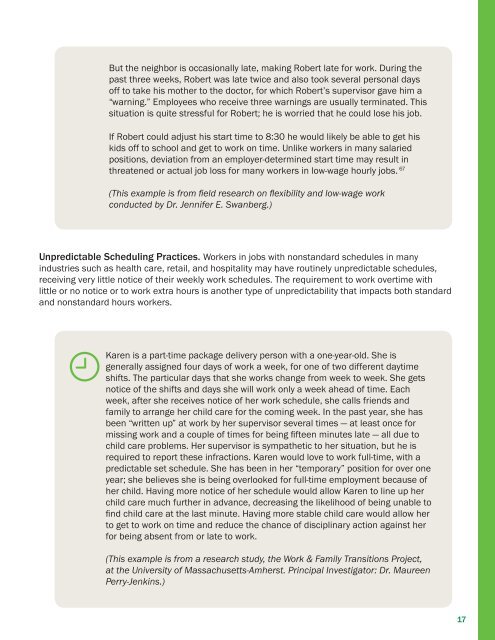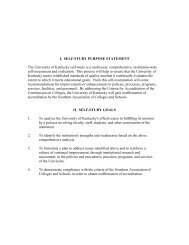Flexible Workplace Solutions for Low-Wage Hourly Workers
Flexible Workplace Solutions for Low-Wage Hourly Workers
Flexible Workplace Solutions for Low-Wage Hourly Workers
You also want an ePaper? Increase the reach of your titles
YUMPU automatically turns print PDFs into web optimized ePapers that Google loves.
But the neighbor is occasionally late, making Robert late <strong>for</strong> work. During the<br />
past three weeks, Robert was late twice and also took several personal days<br />
off to take his mother to the doctor, <strong>for</strong> which Robert’s supervisor gave him a<br />
“warning.” Employees who receive three warnings are usually terminated. This<br />
situation is quite stressful <strong>for</strong> Robert; he is worried that he could lose his job.<br />
If Robert could adjust his start time to 8:30 he would likely be able to get his<br />
kids off to school and get to work on time. Unlike workers in many salaried<br />
positions, deviation from an employer-determined start time may result in<br />
threatened or actual job loss <strong>for</strong> many workers in low-wage hourly jobs. 67<br />
(This example is from fi eld research on fl exibility and low-wage work<br />
conducted by Dr. Jennifer E. Swanberg.)<br />
Unpredictable Scheduling Practices. <strong>Workers</strong> in jobs with nonstandard schedules in many<br />
industries such as health care, retail, and hospitality may have routinely unpredictable schedules,<br />
receiving very little notice of their weekly work schedules. The requirement to work overtime with<br />
little or no notice or to work extra hours is another type of unpredictability that impacts both standard<br />
and nonstandard hours workers.<br />
Karen is a part-time package delivery person with a one-year-old. She is<br />
generally assigned four days of work a week, <strong>for</strong> one of two different daytime<br />
shifts. The particular days that she works change from week to week. She gets<br />
notice of the shifts and days she will work only a week ahead of time. Each<br />
week, after she receives notice of her work schedule, she calls friends and<br />
family to arrange her child care <strong>for</strong> the coming week. In the past year, she has<br />
been “written up” at work by her supervisor several times — at least once <strong>for</strong><br />
missing work and a couple of times <strong>for</strong> being fi fteen minutes late — all due to<br />
child care problems. Her supervisor is sympathetic to her situation, but he is<br />
required to report these infractions. Karen would love to work full-time, with a<br />
predictable set schedule. She has been in her “temporary” position <strong>for</strong> over one<br />
year; she believes she is being overlooked <strong>for</strong> full-time employment because of<br />
her child. Having more notice of her schedule would allow Karen to line up her<br />
child care much further in advance, decreasing the likelihood of being unable to<br />
fi nd child care at the last minute. Having more stable child care would allow her<br />
to get to work on time and reduce the chance of disciplinary action against her<br />
<strong>for</strong> being absent from or late to work.<br />
(This example is from a research study, the Work & Family Transitions Project,<br />
at the University of Massachusetts-Amherst. Principal Investigator: Dr. Maureen<br />
Perry-Jenkins.)<br />
17

















